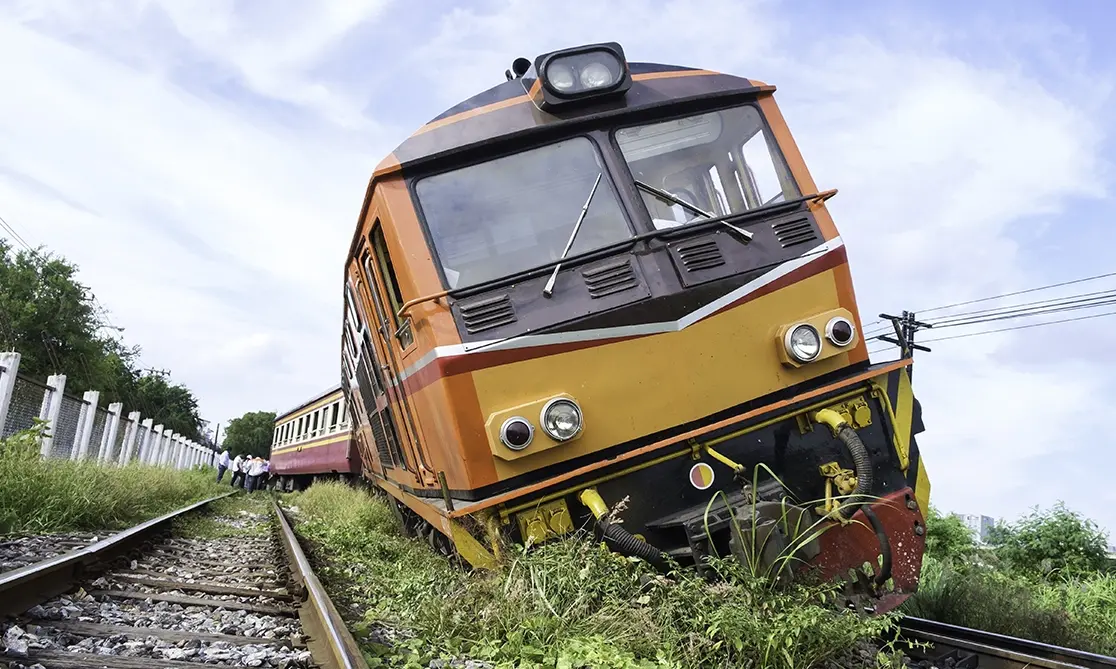Our Past Experience in Train Accident Cases
Leading Litigators in the Glendale Metrolink Train Tragedy
Past Senior Partner, Paul J. Hedlund, who is also a mechanical engineer, testified about passenger car crashworthiness and the dangers of pushing passenger trains at the state hearing conducted by the California State Assembly, looking into the causes of the Glendale Metrolink train tragedy. It was our law firm’s opinion that the “pushing” of passenger cars was likely responsible for the deaths and injuries which resulted from the southbound Metrolink train’s collision with the Jeep left on the tracks. As deranged as the action of parking a vehicle on the railroad tracks was, Metrolink’s unsafe procedure led to the tragic consequences in this case.
Paul Hedlund also testified before the State Assembly hearing on California commuter rail safety as a result of the Metrolink derailment. He showed two independently produced train crash test videos exposing the vulnerability of cab cars. The videos stunned the Committee members when it revealed the cab car with shock absorbers suffered very little damage compared to the cab car without. Mr. Hedlund also discussed push versus pull in general terms and the inherent dangers in pushing passenger cars with a locomotive and why pulling passenger cars with a locomotive is safer.
In December of 2005, almost a year after the Metrolink derailment, and after months of public pressure, Metrolink finally announced that it would install shock absorbers on their trains. On several occasions our firm organized meetings for our clients to personally meet with the state assemblyman and his transportation staff spearheading the push-pull ban legislation. We also organized our clients to meet with the U.S. Representative for the district where the crash occurred, seeking his involvement in improving passenger rail safety in the state of California.
Baum Hedlund Organizes March on State Capitol to Rally Support for Bill
Several of our clients and the firm’s public relations director joined Assembly Majority Leader Dario Frommer (Glendale) at the Burbank airport for a press conference just before taking off for Sacramento. After landing, the Wisner Baum group spent the rest of that day and the next day lobbying 12 of the 13 senators who sit on the Senate Transportation and Housing Committee, to vote yes on the Assembly bill that would ban the pushing of trains.
Our Clients Testify Before the Senate Transportation and Housing Committee
Three of our Metrolink crash clients testified before the California Senate Transportation and Housing Committee in favor of the Assembly bill that, if passed, would ban the pushing of passengers in California and make passenger trains safer. Each one of these victims, a widow and two severely injured passengers, offered excellent testimony, and made it very clear that if their Metrolink train was being pulled that tragic morning, rather than being pushed, the injured would have walked away with much less severe, if any injuries, and no one would have died.
Representing Victims in the 1993 Amtrak Sunset Limited Crash
The crash remained Amtrak’s worst until September 22, 1993, when 47 passengers and crew died when Amtrak’s Sunset Limited plunged off a bridge into a muddy bayou near Saraland, Alabama. Our firm represented 22 victims from this train derailment which was initiated by the mishandling of a barge that struck the bridge just before the wreck.
Maryland was again, the site of a fatal Amtrak crash on February 16, 1996, when 12 people were killed when one of the company’s passenger trains, the Capitol Limited, smashed into a MARC Maryland Rail Commuter train in Silver Spring. We represented six families in the MARC train crash that also involved a locomotive engine pushing the passenger cars ahead of it.
Taking on the 1987 Conrail Train Collision in Chase
The firm handled its very first train disaster in 1987. This was the case of the Amtrak – Conrail train collision in Chase, Maryland on January 4, 1987. In that incident, an Amtrak train, carrying 600 people, on its way to Boston from Washington, D.C., crashed into a set of Conrail freight locomotives bound for Pennsylvania. At the time of the collision it was reported the Amtrak train was traveling at an estimated speed of 108 mph. Train cars were stacked three high from the force of the impact.
The collision caused the deaths of 16 people, including the Amtrak engineer, and 175 people were also injured, making it, at that time, Amtrak’s deadliest wreck in its history.
Our clients suggested to the committee, the many changes needed to make passenger trains safer. Some of their proposals included banning pushing of trains, installing automatic gates at all rail crossings, installing sensors, radar and/or cameras to warn of obstructions, train turnarounds, passenger car crashworthiness improvements, seat belts, better rail disaster training and alerting of passengers before a crash.
Why Work with Wisner Baum
Here are a few reasons to consider hiring our experienced train safety advocates and train accident lawyers at Wisner Baum:
- Over $4 billion won firm-wide
- Extensive high-level experience
- Handling train accidents since 1987
- Voted “Best Lawyers® Best Law Firms” by our clients and peers
- Successfully resolved over 85 train crash or derailment cases
- Major honors and national recognition for our achievements
- Appointed to Plaintiffs’ Steering Committees for Metrolink Glendale and Chatsworth
If you or a loved one have been a victim of a train accident, contact Wisner Baum at (310) 207-3233 or submit our online contact form today for a free consultation.

